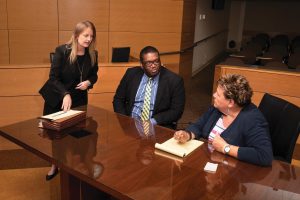Family law encompasses a variety of issues, from domestic violence and child abuse to divorce and homelessness. It is one of the most important legal specialties, considering who’s often involved: children. Family law attorneys not only need strong legal skills but also the ability to work with clients facing emotional and high-stakes situations.
The following law schools earned a place on our Family Law Honor Roll, recognized for the strength of their programs. Following the list, you’ll find the latest developments and news from family law programs at these various law schools.
Top law schools for family law
The work often blends litigation, negotiation and advocacy, and increasingly includes collaboration with professionals in social work, psychology and education.

University of Missouri-Kansas City School of Law is one of the only law schools in the country that offers an emphasis in child and family law in both its J.D. and LL.M. programs. The school also has two in-house child and family law clinics and a study abroad program focused on family law. In addition, it publishes one of only a handful of family law journals. The school’s family law emphasis includes 20 courses in the areas of divorce, child custody, premarital agreements and child advocacy.
UMKC’s Child and Family Services Clinic functions as a law firm within the school and provides litigation experience for all participating students. In addition to studying Missouri’s family law statutes and rules, clinic students learn about the state’s child protection system and the juvenile court.
Family law is very much trial work, and it’s also a place where attorneys need to have strong advocacy skills, said Dean Barbara Glesner Fines.
“Nationally, I feel like child and family law has gained more respect,” Glesner Fines said. “Increasingly, attorneys and law students recognize that family law is challenging emotionally and challenging intellectually.”
All students in the family law emphasis at UMKC are expected to prepare an electronic portfolio that highlights their legal skills and readiness for practice. Classroom assignments and individual coaching from professors ensure that each student can create a comprehensive record that can be shared with potential employers.
The University of Arizona James E. Rogers College of Law has a new Education Advocacy Clinic. The clinic provides services at no cost to students in nearby public schools. Clinic participants provide information regarding students’ educational rights and work with families as well as school officials. In its inaugural year, the clinic assisted several families with school discipline and special education matters, obtaining outcomes such as expunging a student’s suspension record and obtaining a school-based plan to address a student’s mental health needs.
The Kansas Supreme Court honored Washburn University School of Law professor emerita Linda Elrod with its Justice Award for her decades-long impact on family law and child advocacy. Elrod is the first woman to receive the award since its inception in 1989. Over her 50-year career, she taught family law, mentored generations of attorneys, and advocated for child welfare reform in Kansas and beyond.
Elrod founded Washburn’s family law certificate program in 1994, helped shape Kansas’s child support guidelines, and edited the Family Law Quarterly. She was also the first woman to serve as president of the Topeka Bar Association and first in her graduating law class.
The Children’s Rights Clinic at Drake University Law School offers students the opportunity to advocate for vulnerable children in the legal system. Under faculty supervision, students serve as guardians ad litem and attorneys for children involved in abuse, neglect and juvenile delinquency cases. They gain hands-on experience by conducting investigations, drafting legal documents, and representing clients in court proceedings. This clinic emphasizes both legal skill development and a deep commitment to child welfare and justice.
Capital University Law School offers a robust family law program centered around its Family Advocacy Clinic, which is divided into two specialized units. The Civil Protection Unit (CPU) involves students assisting victims of domestic violence in obtaining civil protection orders. The Child Custody Unit (CCU) has students helping clients navigate complex child custody disputes, often involving high-conflict family dynamics. The law school also hosted its nationally recognized 20th annual National Child Welfare & Adoption Law Moot Court Competition.
Methodology
preLaw magazine grades law schools based on the breadth of their curricular offerings. Scores are weighted as follows: 30% for a concentration, 24% for a clinic, 12% for a center, 12% for an externship, 9% for a journal, 8% for a student group, 5% for a certificate and added value for additional offerings.

